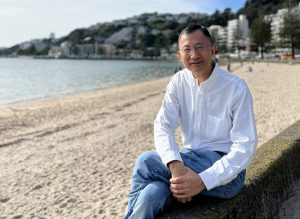Emerging Topics in Mechanics
Dr. Huajian Gao
 Huajian Gao is a Chinese American scientist who is widely known for his contributions to the field of solid mechanics, particularly on the micro- and nanomechanics of thin films, hierarchically structured materials, and cell-nanomaterial interactions. He is one of 6 Distinguished University Professors at Nanyang Technological University in Singapore and Walter H. Annenberg Professor Emeritus of Engineering at Brown University. He is the editor-in-chief of Journal of the Mechanics and Physics of Solids.
Huajian Gao is a Chinese American scientist who is widely known for his contributions to the field of solid mechanics, particularly on the micro- and nanomechanics of thin films, hierarchically structured materials, and cell-nanomaterial interactions. He is one of 6 Distinguished University Professors at Nanyang Technological University in Singapore and Walter H. Annenberg Professor Emeritus of Engineering at Brown University. He is the editor-in-chief of Journal of the Mechanics and Physics of Solids.
Gao was born in Chengdu, a city in the middle of China with 16 million residents. He received his B.S. in Engineering Mechanics from Xi’an Jiaotong University of China in 1982, and his M.S. and Ph.D. in Engineering Science from Harvard University in 1984 and 1988, respectively. He taught at Stanford University between 1988 and 2002, where he was promoted to Associate Professor with tenure in 1994 and to full Professor in 2000. He joined the Max Planck Society in 2001 as a Director at the Max Planck Institute for Metals Research in Stuttgart, Germany. In 2006 he moved to Brown University as the Walter H. Annenberg Professor of Engineering. In 2019, he joined Nanyang Technological University as a Distinguished University Professor, also jointly affiliated with the Agency for Science, Technology and Research (A*STAR) in Singapore as the scientific director of Institute of High Performance Computing.
Gao has a background in applied mechanics and engineering science. His past research has been focused on the understanding of basic principles that control mechanical behaviors of materials in both engineering and biological systems. His current research interests include mechanics of materials and an emerging paradigm shift from the classical objectives of the field in passive descriptions of materials behaviors toward proactive programming of materials properties and functionalities during the manufacturing process by leveraging the fundamental mechanics principles.
Gao has received numerous academic honors, ranging from a John Simon Guggenheim Fellowship in 1995 to some of the highest life achievement awards in his field including the Timoshenko Medal in 2021 for “pioneering contributions to nanomechanics of engineering and biological systems”, and the Rodney Hill Prize in 2012 for “his deep and broad scientific achievements in basic solid mechanics and its bridge to other fields, which has re-defined the modern frontiers of mechanics research.” He was elected to the National Academy of Engineering in 2012, to the Chinese Academy of Sciences (as a foreign academician) in 2015, the German Academy of Sciences Leopoldina in 2017, the National Academy of Sciences in 2018, Academia Europaea in 2019, American Academy of Arts and Sciences in 2019, and the Royal Society in 2023.